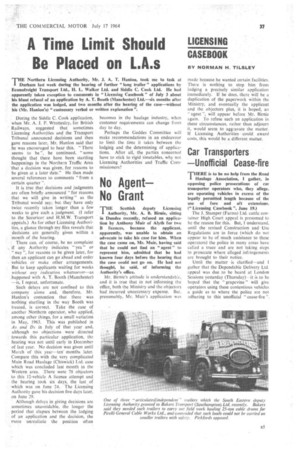A Time Limit Should LICENSING Be Placed on LIU CASEBOOK
Page 39

If you've noticed an error in this article please click here to report it so we can fix it.
BY NORMAN H. TILSLEY
THNorthern Licensing Authority, Mr, J. A. T. Hanlon, took me to task at DEurham last week during the bearing of further "long trailer" applications by Econofreight Transport Ltd., H. L. Walker Ltd. and Siddle C. Cook Ltd. He had apparently taken exception to comments in "Licensing Casebook" of July 3 about his blunt refusal of an application by A. T. Booth (Manchester) Ltd.—six months after the application was lodged, and two months after the hearing of the case—without his (Mr. Hanlon's) "customary verbal or written explanation ".
During the Siddle C. Cook application, when Mr. A. J. F. Wrottesley, for British Railways, suggested that sometimes Licensing Authorities and the Transport Tribunal announced decisions and then gave reasons later, Mr. Hanlon said that he was encouraged to hear this. "There seems to be '', he continued, "some thought that there have been startling happenings in the Northern Traffic Area that a decision was given, for reasons to be given at a later date." He then made several references to comments "from a certain quarter ".
It is true that decision's and judgments are often briefly announced "for reasons that we will give in writing" as the Tribunal would say; but. they have only twice recently taken longer than a few weeks to give such a judgment. (I refer to. the Securicor and H.M.W. Transport appeals.) As for other Licensing Authorities, a glance through ray files reveals that ,decisions arc generally given within a
month of the hearing.
There can, of course, be no complaint , If any Authority indicates " yea " or " nay ", for reasons to be given later, for then an applicant can go ahead and order vehicles or make other arrangements. But to keep applicants waiting for weeks without any indication whatsoever—as .happened with A. T. Booth (Manchester) —is, I repeat, unfortunate. • Such delays are not confined to this company alone and, therefore, Mr. Hanlon's contention that there was nothing startling in the way Booth was treated, is correct. Take the case of another Northern operator, who applied, among other things, for a small variation in May, 1963. This was published in As and Ds in July of that year and, although no objections were directed towards this particular application, the bearing was not until early in December of last year. No decision was given until March of this year—tenmonths later, Compare this with the very complicated Main Road Haulage (Chiswick) Ltd. case which was concluded last month in the Western area. There were 78 objectors to this 12-vehicle A licence attempt and the hearing took six days, the last, of which was on June 24, The Licensing Authority gave his decision five days later, on June 29.
Although delays in giVing decisions are sometimes unavoidable, the longer the period that elapses between the lodging of an application and the decision, the more unrealistic the position often becomes in the haulage industry, when customer requirements can change from day to day.
Perhaps the Geddes Committee will make recommendations in an endeavour to limit the time it takes between the lodging and the determining of applications, After all, the parties concerned have to stick to rigid timetables, why not Licensing Authorities and Traffic Commissioners?
No Agent—
No Grant
THE Scottish deputy Licensing 1 Authority, Mr. A. B. Birnie, sitting in Dundee recently, refused an application by Anthony Muir of Alyth for two B licences, because the applicant, apparently, was unable to obtain an advocate to take his case for him. When the case came on, Mr. Muir, having said that he could not find an " agent " to represent him, admitted that he had known four days before the hearing that the case could not go on. He had not thought, he said, of informing • the Authority's office.
Mr. Birnie's attitude is understandable, and it is true that in not informing the office, both the Ministry and the objectors had incurred unnecessary expense. But, presumably, Mr. Muir's application was
made because he wanted certain facilities. There is nothing to stop him from lodging a precisely similar application immediately. If he does, there will be a duplication of the paperwork within the Ministry, and eventually the applicant and the objectors plus, it is hoped, an " agent '', will appear before Mr. Birnie again. To refuse such an application in these circumstances, rather than adjourn it, would seem to aggravate the matter. If Licensing Authorities could award costs, this would be a different matter.
Car Transporters —Unofficial Cease-fire
THERE is tote no help from the Road I Haulage Association, I gather, in opposing police prosecutions of car transporter 'operators who, they allege, are operating vehicles in excess of the legally permitted length because of the use of fore and aft extensions. ("Licensing Casebook ", June 19.) The J. Stamper (Farms) Ltd. cattle container High Court appeal is presumed to be the reason for this. But, I understand. until the revised Construction and Use Regulations are in force (which do not appear to be of much assistance to these operators) the police in many areas have called a truce and are not taking steps to prosecute where alleged infringements are brought to their notice.
Until the matter is clarified—and gather that the Dependable Delivery Ltd. appeal was due to be heard at London Sessions yesterday (Thursday)—it is to be hoped that the " grapevine " will give operators using these contentious vehicles a guide as to where the police are not adhering to this unofficial "cease-fire".
















































































































